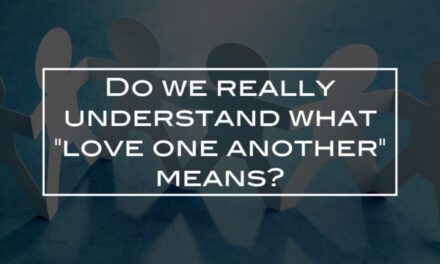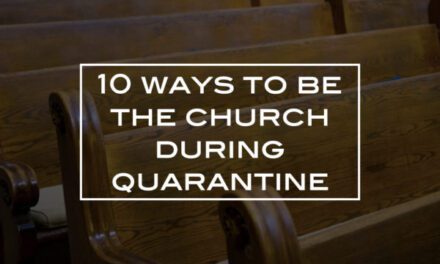“I’m mostly a good person, so I’m okay with God.”
“It’s not like God is going to send me to hell for that one little sin.”
“My good deeds outweigh the bad, so I don’t think God is going to judge me for doing _____.”
“Well, God gives us grace so I’m sure He’ll forgive me for this one.”
“It’s just the one sin. I try to obey God on everything else.”
People have been making excuses for willful sins since the Garden of Eden. It’s nothing new, and it’s also not something that’s out of the ordinary, either. None of us like to think of ourselves as people with a sin problem. As my brother put it, we’re too comfortable both with our sin and with our lack of sin. In other words, we can fall into the trap of thinking that the sins we commit aren’t that bad and besides, there are a lot of other sins we don’t commit, so it’s all good, right? But as many who claim to be Christians like to assert that God won’t send us to hell over “the little things,” the question must be asked – what does God do with the sins we find excusable or reasonable? What happens if we don’t do a whole host of sins but hang on to one or two that we think we are owed or that we believe make us happy? Will God send us to hell for those things? Will grace cover them?
While the Bible gives direct answers to those questions (Romans 6:23, Hebrews 10:26-29, among others), we as humans don’t always think long term. We live in an instant gratification society, and sometimes making a choice today based off of a long-term, unseen decision between heaven and hell can be difficult. What we need to do is show why the long-term effect of sin and the short-term are inseparable.
Consider the logical progression of making a conscious decision to be complacent with the presence of your particular sin in your life.
What you’re saying is that you think your life will be happier or more enjoyable with that sin. Fill in whatever it may be – a sinful relationship, dishonesty at work, alcohol or drug addiction, an unrestrained tongue, anger, pornography/lust, or whatever the sin may be. Maybe we’re doing well fighting most every other sin, but when we have this attitude we feel entitled to keep doing whatever it may be.
What that says is that you think God has held something back from you. You believe that He has placed a choice before you that you can either be happy or you can obey Him, but you can’t do both. Unfortunately, Christians can project this attitude to their worldly friends when they reminisce about “the good old days,” before they had to start acting a certain way out of some obligation to God and the church, or when they imply that they would go out and engage in whatever sin, but they aren’t allowed to. To walk in the light, though, is to hate sin and realize that it leads to nothing but death and our lives are never happier when we choose sin over God. As C.S. Lewis said, “God cannot give man a happiness and peace apart from Himself because it is not there. There is no such thing.” Augustine shared that same thought many years earlier, saying, “God looks mercifully upon man when He does not allow them any lasting contentment in anything that is not Him.” As long as we think we have to choose between truly happy lives and obedience to God, we’ve completely misunderstood who God is.
What that says is that you don’t have faith in God. If you truly think that God is holding back and making you live a deprived life, you don’t trust His promises. You’re calling the psalmist (and the Holy Spirit) a liar for finding that true delight comes from God’s commands, as He expressed nine times in various ways in Psalm 119. You’re saying that life is better when you call the shots than when God does. That says God is not to be trusted.
What that says is that God will not count you righteous (Romans 4:3) and will not save you (Ephesians 2:8). The Christian is not called to be perfect, but when any Christian makes a conscious decision to continually hang onto a sin they find enjoyable or place something in this life above God, they’ve decided to live without faith. Without faith it is impossible to please Him (Hebrews 11:6).
What that says is that God will, in fact, send someone into hell for a “little sin.” If He doesn’t count you as righteous through a working faith in Christ’s blood, and doesn’t have that faith that He requires from us to save us, He has no other choice. In one sense, God doesn’t so much send people to hell as He lets people choose it. Someone who (through their actions) is daily telling God that they believe sin to be more enjoyable, more fulfilling, and more desirable than a relationship with Him has already made their choice. If Jesus can send away the rich young ruler (who had a lot better record than most of us) because he placed his riches above God, God can send us away when we choose (fill in the blank sin) over trusting and obeying the Father.
I’m afraid this point is lost on a lot of churchgoers today. Because churches have pretty well staked out their doctrines and we’re assured that we’re right, from there it’s a matter of going into autopilot. We can be caught going an entire lifetime mechanically obeying what’s right and what’s wrong. The problem is, that hasn’t been good enough for the last generation. One generation does things “Because the Bible says so.” The next one does most of those things, but excuses the sins they want to commit because “It’s not like God will send me to hell for it.” By the third generation, “Because the Bible says so” is all but meaningless, since the entire foundation lacked the faith that answers why the Bible said for us to do anything – because God loves us and has given us the path for joyful, fulfilling lives here with the confidence of eternal life in heaven with Him afterwards.
To avoid the trap of being comfortable with our sins and with our lack of sins, we have to know what we’re supposed to do and why we’re supposed to do it, and then we have to trust that if God commanded it, it’s the best thing for us. Love is the driving force of all of God’s actions, and it’s why we have hope even though we’re going to keep on struggling with sin. Faith that the struggle to kill those sins will be worth it must be the driving force in all of our choices.
By Jack Wilkie
Jack Wilkie is the author of “Failure: What Christian Parents Need to Know About American Education” and is the speaker for Focus Press’s “The Lost Generation” seminar. To schedule a seminar at your church or for more info, contact jack@tampaseo.expert.
Why “I’m mostly a good person” isn’t good enough





